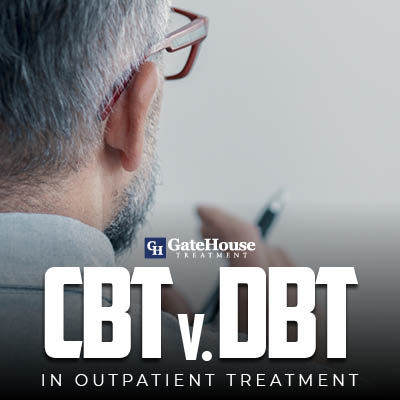
CBT vs DBT: Definitions
Cognitive-behavioral therapy or CBT, is one of the most commonly used therapies today, especially in outpatient treatment with drug addiction counseling. Dialectal behavior therapy or DBT is a specific form of cognitive-behavioral therapy.
CBT’s focus is on helping people learn how their thoughts color and actually change their feelings and behaviors. CBT is usually time-limited and goal-focused. DBT seeks to build upon the foundation of CBT to enhance its effectiveness and address specific concerns that the founder of DBT saw as deficits in CBT. So it’s not always a strict case of one treatment or another (CBT vs DBT), they are often used together.
DBT in Drug Rehab
DBT is more focused on the psycho-social aspects of outpatient treatment in drug addiction counseling—for instance, how a person interacts with others in different environments and relationships. The theory behind the approach is that some people are prone to react in a more intense and out-of-the-ordinary manner toward certain emotional situations, primarily in romantic, family and friend relationships. DBT was originally designed to help treat people with borderline personality disorder but is now used in other cases, especially those with a background of substance abuse
DBT Origins
The DBT theory suggests that some people’s arousal levels in certain situations can increase far more quickly than the average person’s. This leads to a person attaining a much higher level of emotional stimulation than normal and it may take a significant amount of time to return to normal arousal levels.
DBT is a cognitive-behavioral treatment developed by Marsha Linehan, Ph.D., in the 1980s to treat borderline personality disorder (BPD). Those diagnosed with BPD often experience extremely intense negative emotions that are difficult to manage. These intense and seemingly uncontrollable negative emotions are often experienced when the individual is interacting with others—friends, romantic partners, or family members. People with BPD often experience a great deal of conflict in their relationships.
As its name suggests, DBT is influenced by the philosophical perspective of dialectics; balancing opposites. The therapist consistently works with the individual to find ways to hold two seemingly opposite perspectives at once, promoting balance and avoiding black and white—the all-or-nothing styles of thinking. In service of this balance, DBT promotes a “both-and” rather than an “either-or” outlook. The dialectic at the heart of DBT is acceptance and change.
CBT vs DBT for Addiction
A person may enter drug addiction counseling with only a limited belief in the worth of changing. For a person with low self-esteem or the need to overcome serious past trauma, DBT may be an ideal first step for preparing a person to change in healthy ways. Because addiction treatment is an ongoing process, it may be necessary to switch to CBT at some point during treatment.
There is no single right way to treat addiction according to SAMHSA; it’s not always a case of CBT vs DBT. A type of therapy that works for a person early on in treatment may need to change after a few weeks or months. The goal of talk therapy is to give patients the tools they need to cope with stress and effectively manage temptations. Patients who learn ways to cope with each day’s problems are better equipped for living sober long-term.
CBT vs DBT—both are proven methods for helping people turn away from a destructive lifestyle. Because the techniques set realistic goals and guide a person through achieving them, they create lasting change in a person’s life.
If you’re thinking: “How can I find drug addiction counseling?” Contact us at GateHouse Treatment 24/7 for immediate help. We are available to you 24/7 at (855) 448-3706.
- Cymbalta Withdrawal: Causes, Symptoms, And Management - October 12, 2023
- Boredom in Recovery: 5 Tips to Avoid Relapse - October 6, 2023
- Overconfidence and Rehab: Avoiding Relapse - October 4, 2023




